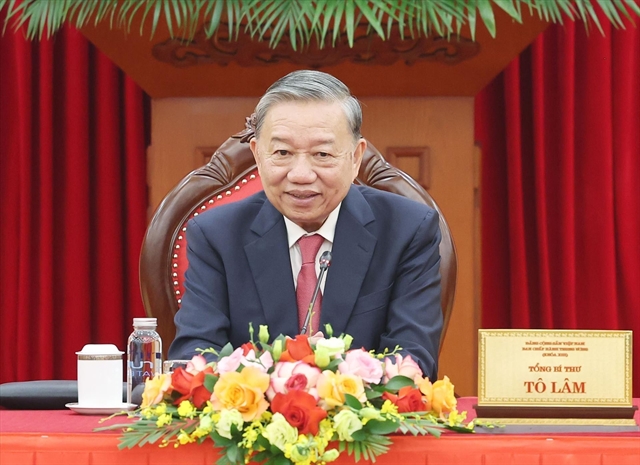 Politics & Law
Politics & Law


|
| A view of the 28th ASEAN Plus Three Summit in in Kuala Lumpur, Malaysia on Monday. VNA/VNS Photo |
HÀ NỘI — Prime Minister Phạm Minh Chính has called for ASEAN+3 to step up cooperation with a sharper economic focus and greater regional resilience as the bloc navigates rising external challenges.
He proposed three key orientations to strengthen collaboration in the new context: improving the quality of economic, trade and investment ties; reinforcing regional resilience and self-reliance; and fostering unity to maintain an environment of peace, security and stability.
He expressed his hope that ASEAN+3 will deepen connectivity and accelerate innovation to advance inclusive and sustainable development while effectively responding to external shocks.
He made the remarks on Monday while attending the 28th ASEAN+3 Summit alongside leaders of ASEAN member states, China, Japan and the Republic of Korea, in Kuala Lumpur, Malaysia. This was part of a series of ASEAN summits with dialogue partners.
Participants noted that 62 per cent of the ASEAN+3 Work Plan for 2023–2027 has been implemented. The ongoing multilateralisation of the Chiang Mai Initiative Multilateralisation (CMIM) has contributed to strengthening the region’s financial safety net. The ASEAN+3 Macroeconomic Research Office (AMRO) continues to play an active role in supporting member countries’ macroeconomic stability policies while the ASEAN+3 Emergency Rice Reserve (APTERR) has become an effective tool in promoting regional food security.

|
| Prime Minister Phạm Minh Chính attends the 28th ASEAN Plus Three Summit. VNA/VNS Photo |
Leaders emphasised that, amid global and regional uncertainties, ASEAN+3 must reaffirm its role as a key driver of cooperation, fostering a conducive environment for sustained growth in East Asia, responding effectively to emerging challenges, and enhancing resilience to both internal and external shocks.
In their remarks, leaders from China, Japan and the Republic of Korea underscored the theme of 'Inclusiveness and Sustainability,' praised ASEAN’s central role in promoting regional growth and development and reaffirmed their commitment to supporting the realisation of the ASEAN Community Vision 2045. They also voiced support for advancing the ASEAN Power Grid and negotiations on the ASEAN Digital Economy Framework Agreement.
The countries agreed to accelerate the implementation of the ASEAN+3 Work Plan 2023–2027, effectively review and expand the Regional Comprehensive Economic Partnership (RCEP) and further strengthen regional financial cooperation through CMIM and the Rapid Financing Facility (RFF). They also highlighted the need to enhance support for micro, small and medium-sized enterprises (MSMEs) and to promote the development of a digital, green and sustainable economy.
At the same time, they called for stronger collaboration in combating transnational crime, managing borders, ensuring food and energy security and addressing pandemics, climate change and natural disasters. These efforts all aimed at building inclusive and resilient societies for future generations.
In his remarks, PM Chính emphasised the importance of improving the quality of economic, trade and investment cooperation, accelerating digital and green transformation across the region and making full use of the upgraded ASEAN–China Free Trade Area (FTA 3.0). He urged the swift review and upgrading of ASEAN’s FTAs with Japan and the Republic of Korea, expanding the RCEP and linking it with other regional frameworks to diversify markets and supply chains.
He also called for increased investment in digital infrastructure and data centres, deeper digital trade cooperation and the development of shared databases and economic governance capacity to support effective digitalisation.
The Prime Minister stressed the need for synchronised and effective implementation of APTERR and RFF, enhanced cooperation on energy security, research and development of emergency energy reserves, and investments in climate-resilient infrastructure and early disaster warning systems.
He proposed that East Asian countries support ASEAN members seeking to develop nuclear power by transferring technology, sharing experience, training human resources and ensuring nuclear safety.
He further suggested greater financial connectivity among ASEAN+3 financial centres to attract green capital flows that would accelerate the region’s digital and green transformation.
PM Chính affirmed that ASEAN+3 should remain a platform for unity, dialogue, trust-building and comprehensive, inclusive and sustainable cooperation. It should work together to address common regional and global challenges, including the protection of cyberspace in ways that safeguard human rights and the interests of the people, he added.
He also underscored the need for all countries to respect international law, the United Nations Charter and the 1982 UN Convention on the Law of the Sea (UNCLOS), to engage in candid dialogue and sincere, trust-based cooperation, and to resolve disputes peacefully. Together, he said, countries should help shape an open, inclusive, transparent and rules-based regional architecture with ASEAN at its centre.
At the conclusion of the summit, ASEAN+3 leaders adopted a Declaration on Strengthening Regional Economic and Financial Cooperation. — VNS